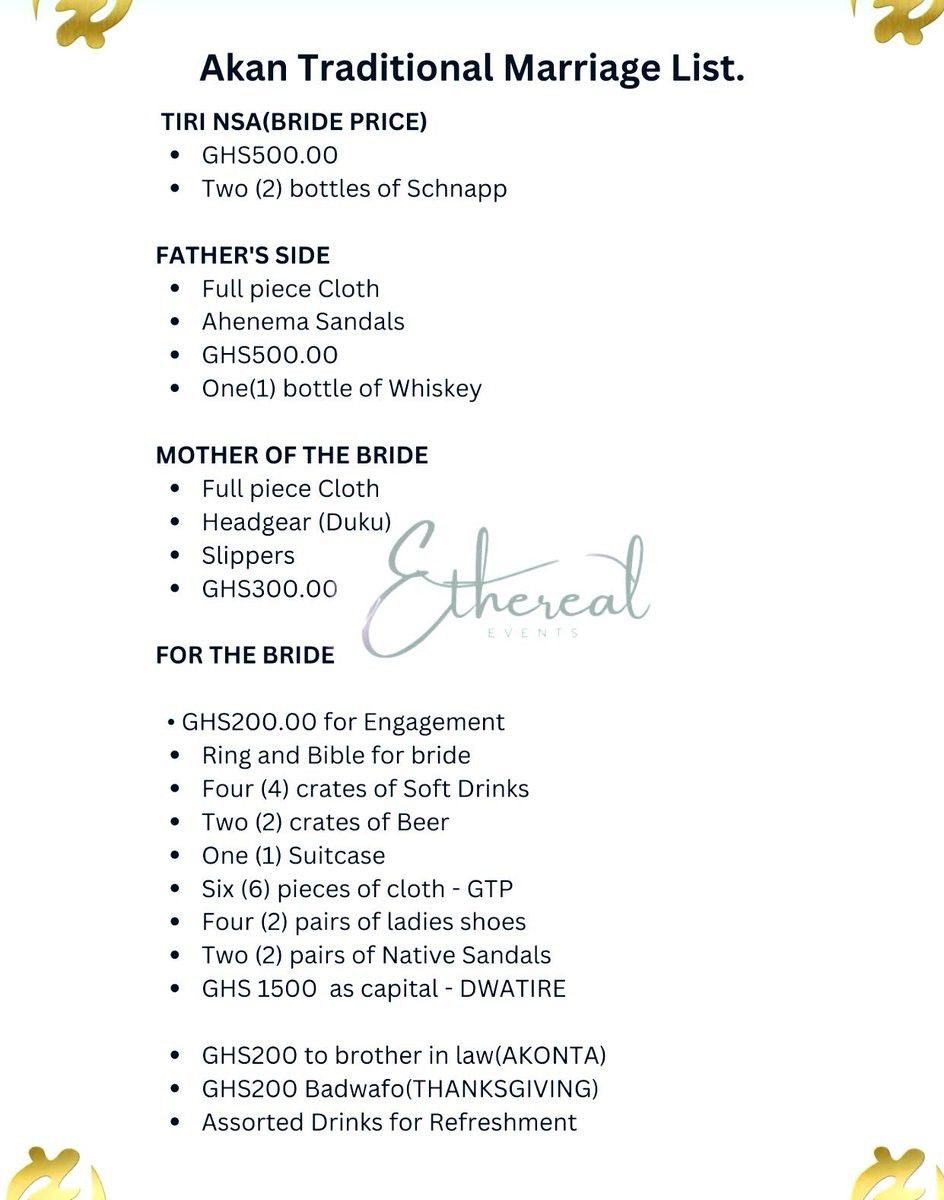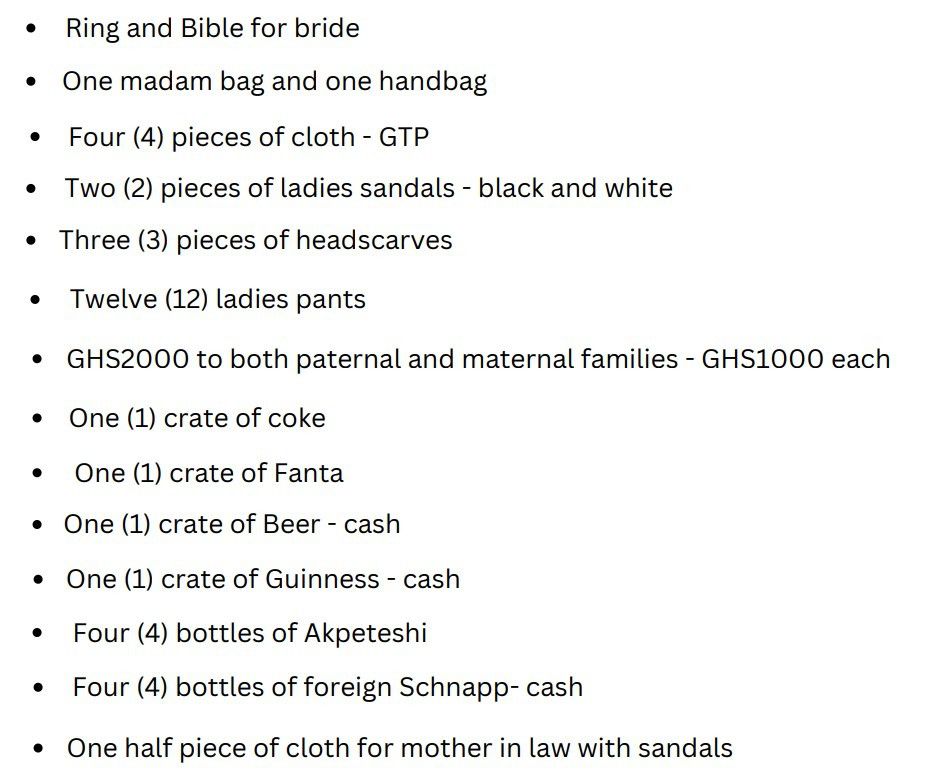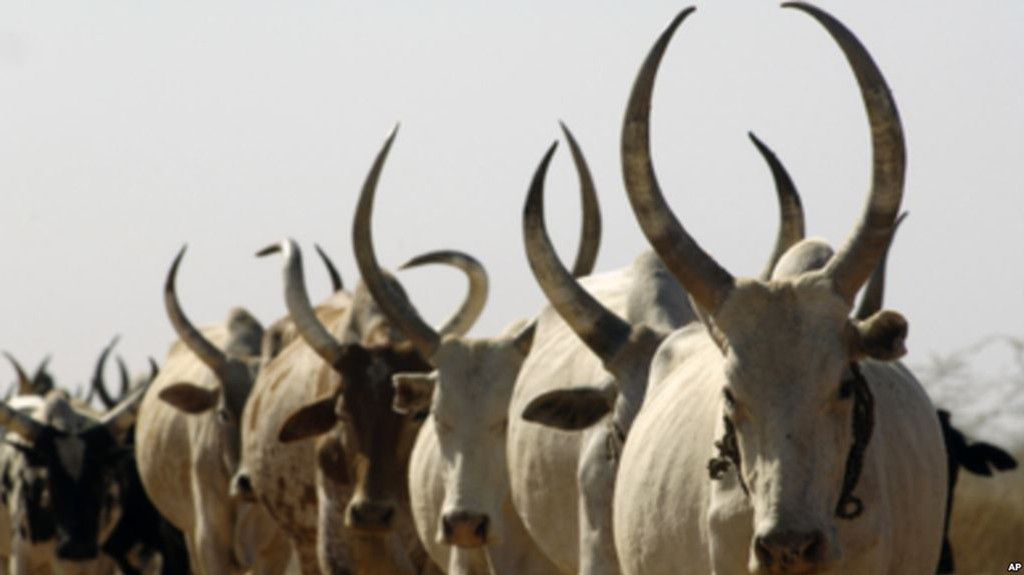While the amount and nature of the dowry vary across different tribes, some are known for demanding particularly high dowries. Here’s a look at some of the tribes in Ghana with the most expensive dowry requirements:
1. Krobo tribe
The Krobo people, found primarily in the Eastern Region of Ghana, are known for their costly dowry requirements. The dowry often includes a significant amount of money for the parents of bride, her siblings and the bride herself.
They also include Cloth, jewellery (especially beads), scarves, bible, rings, and drinks (such as schnapps or local gin).
The elaborate nature of Krobo traditional marriage ceremonies contributes to the high dowry, with many items symbolising different aspects of respect, fertility, and goodwill.
2. Akan tribe (Asante)
The Akan, specifically the Asante subgroup, have some of the highest dowry demands in Ghana. The Asante people place a strong emphasis on tradition, and dowry items often include large sums of money for almost every family member.
Pieces of cloth (such as Dutch print) for the mother of the bride, they even ask for a sewing machine if the woman is a dressmaker, jewellery, and capital to start a business if she's not employed. Drinks can come in various forms ranging from alcoholic to non-alcoholic.
The Asante dowry is considered a token of appreciation for the bride's upbringing and is often viewed as a reflection of the groom’s ability to provide for his future wife.

3. Ewe tribe
Among the Ewe people, found in the Volta Region, the dowry can also be quite expensive. The dowry list typically includes money, drinks (both alcoholic and non-alcoholic), cloth, footwear, scarves, a wide range of kitchenware, some money for the bride's family and many more items.
The Ewe's marriage ceremonies are rich in cultural rituals, and the dowry is an essential part of these celebrations. Meeting the dowry requirements is seen as a demonstration of the groom’s commitment and capability to take care of the bride.

Ga-Adangbe tribe
The Ga-Adangbe people, residing mainly in the Greater Accra Region, also have notable dowry expectations. The dowry often includes items like money for almost every family member, kente cloth, jewellery, and drinks.
The Ga-Adangbe community places significant importance on family ties and cultural traditions, which are reflected in their dowry practices. The items given are meant to honour the bride’s family and ensure blessings for the marriage.
5. Dagomba and Frafra tribe
The Dagomba, and Frafra are ethnic groups in the Northern Region of Ghana, that have a dowry system that can be quite substantial. Dowry items typically include money, cola nuts, clothes, drinks, and cows.

The Dagomba and Frafra traditional marriage ceremony is a significant cultural event, and the dowry serves as a means of formalising the union and showing respect to the bride’s family.
The dowry practices in these Ghanaian tribes reflect deep cultural values, respect for family, and the importance of tradition.
While the expenses involved in dowry can sometimes be seen as a financial burden, they are an integral part of the marriage process, symbolising honour, respect, and commitment.
As society evolves, there is ongoing discussion about balancing cultural practices with economic realities, ensuring that the sacredness of marriage traditions is maintained without imposing undue hardship on families.

)
)
![The health benefits of ginger and garlic are unbelievable [Food NDTV]](https://image.api.sportal365.com/process/smp-images-production/pulse.com.gh/01082024/5b4e44ba-339f-485e-b69a-43cf8c8332e5?operations=autocrop(236:157))
)
)

)
)
)
)
,fit(112:112))
![Goalkeeper 'forced to fake injury' to let Muslim team-mates break Ramadan fast [Video]](https://sportal365images.com/process/smp-images-production/pulse.com.gh/26022026/3cc3108a-9cb3-4021-9903-6b6d7ceb3d6d.png?operations=crop(451:1:1007:557),fit(112:112))
)